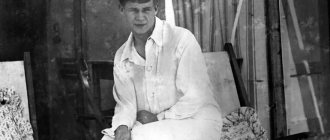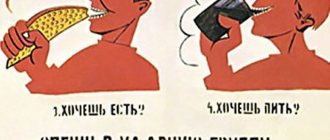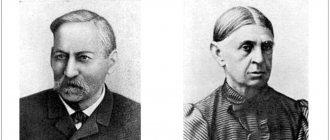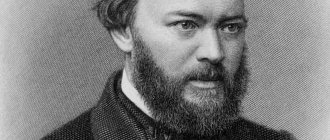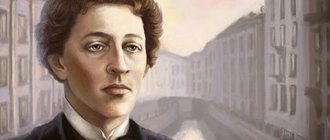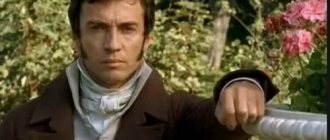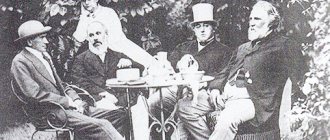Childhood and youth
Ivan Andreevich Krylov was born in Moscow on February 13, 1769. His father Andrei Prokhorovich was a poor army officer who served as captain of the Yaitsk fortress. The latter came under siege during the Pugachev uprising. Krylov’s wife and little son (Ivan was less than five years old at the time) were on Pugachev’s list for hanging. They left for Orenburg, but the city also found itself in a state of siege. Severe hunger, lack of food even for children - this made an indelible impression on Ivan. For the rest of his life he suffered from constant gluttony.
Soon after the suppression of the riot, Andrei Prokhorovich retired, moved with his family to Tver and entered the civil service. They paid little there, and after the death of the breadwinner, the financial situation deteriorated even more.
Ivan Krylov did not receive a good or at least systematic education. The father instilled in his son a love of reading , the neighbors allowed him to attend their children’s French lessons. Vanya himself read a lot and taught himself to play musical instruments. He also often visited ordinary people at fairs and studied their customs, characters and language well. This helped him later.
Andrei Prokhorovich died in 1778, when Ivan was only 9 years old. The child was hired as a sub-clerk at the Tver provincial magistrate, where his father had previously worked. There was barely enough money for food. After 5 years, Krylov’s mother and children (Ivan had a brother Lev) moved to St. Petersburg to work for a pension and get the eldest into the service. The future fabulist received a position as a clerk in the treasury chamber.
A few years after the move, the mother died. Ivan sent his brother to the guard.
Chronological table of Krylov
Krylov's chronological table will allow you to get acquainted with the life and work of the famous fabulist. Ivan Andreevich, who served as a simple scribe in a government institution, had a great influence on Russian literature. When every schoolchild and adult hears the word “fable,” the first name that comes to mind is “Krylov.” Despite the fact that Ivan Andreevich did not have important government officials, the imperial dynasty valued him very much - on the 50th anniversary of his creative activity, he was awarded a medal by order of the emperor. Today, Ivan Andreevich’s fables have also not lost their relevance - schoolchildren read them and adults re-read them.
Krylov's biography by dates - information that will be useful when creating interactive materials, such as tests, quizzes on literature and in preparing for tests and examinations at school and universities.
1768 February 2 (13) – Ivan Andreevich Krylov was born. The place of birth is not known exactly, perhaps Moscow, Troitsk or Trans-Volga region.
1774 – The family moves to Tver due to the appointment of the father as chairman of the criminal chamber of the provincial magistrate.
1777 “Father arranges little Krylov as a sub-clerk at the Kalyazinsky Lower Zemstvo Court, but Ivan is not interested in work, he is only listed among the employees. At the same time, Ivan Krylov managed to surprise the Tver landowner N.P. Lvov with his poems. For this he was allowed to study with the landowner's children; independently studies literature, mathematics, French and Italian.
1778 – Ivan Krylov’s father dies, leaving a chest of books as an inheritance. The family finds itself in poverty; Ivan is transferred to the Tver provincial magistrate with the rank of sub-office clerk. It was in this service that young Krylov became acquainted with court procedures and bribery.
1783 – Ivan Krylov’s move to St. Petersburg; gets a job with the rank of provincial secretary in the Treasury Chamber and calls his mother and younger brother, Lev, to the capital.
1784 – Writes the comic opera “The Coffee House” (published in 1868); Ivan meets theater director P.A. Soimonov and playwright N.B. Knyazhnin.
1785 – Death of the writer’s mother; Krylov appoints his brother Lev to the guard.
1787 – Krylov receives a place in the Mountain Expedition of the Cabinet of Her Imperial Majesty thanks to P.A. Soimonov, who managed it.
1788 – Written tragedy “Philomela”, comedies: “The Americans”, “Mad Family”, “Writer in the Hallway”, “Pranksters”; Krylov had to leave his service in the Mountain Expedition.
1789 – Ivan Krylov, at the expense of Rachmaninov and in his printing house, publishes the monthly satirical magazine “Spirit Mail, or the learned, moral and critical correspondence of the Arab philosopher Malikulmulk with water, air and underground spirits.”
1789 – “Spirit Mail” suddenly ceases publication.
1791 – Ivan Krylov meets Anna Alekseevna Konstantinova. The girl's parents forbade their daughter to marry a poor writer; Krylov, together with Klushin and friends, open a printing house and a bookstore attached to it.
1792 – Starts publishing the magazine “Spectator”; a search was carried out at Krylov's printing house and soon the magazine ceased publication; the satirical story “Kaib” was written.
1793 – Krylov and Klushin are releasing a new magazine, “St. Petersburg Mercury,” which published prose, poetry, and translations; after a conversation with Empress Catherine II, Krylov decides to leave journalism; St. Petersburg Mercury closes in December.
1794-1797 – Krylov’s passion for gambling, traveling to fairs.
1797 – S.F. invited Golitsyn for the position of personal secretary and children's teacher.
1800 – Krylov writes a joke-tragedy “Triumph or Podschipa” (published in 1871), a satire on the reign of Paul I and the entire royal court. The play was staged in the home theater of S.F. Golitsyn.
1801 – Prince Golitsyn was appointed military governor-general of Riga, he is accompanied by Ivan Krylov; the comedy “Pie” was written (staged in St. Petersburg and Moscow).
1802 – “Mail of Spirits” has been republished in St. Petersburg.
1803 – Krylov leaves Riga for Serpukhovo to visit his brother Lev, an officer of the Oryol Musketeer Regiment.
1806 – Ivan Andreevich returns to St. Petersburg; publishes three fables in the magazine “Moscow Spectator”: “The Oak and the Cane”, “The Picky Bride”, “The Old Man and the Three Young People”.
1806-1807 – Krylov writes two comedies: “A Lesson for Daughters”, “Fashion Shop”. The comedies were a resounding success and were shown in theaters for a long time; composes the opera “Ilya the Bogatyr”.
1808 – A.N. Olenin helps Krylov get a job in the Coinage Department.
1809 – Ivan Andreevich is running for the Russian Academy; Book I of Fables published.
1810 – Ivan Krylov resigns from the Mint with the rank of titular adviser.
1811 – The collection “New Fables of Ivan Krylov” is published; Krylov is elected to the Russian Academy; is a member of the literary circle "Conversation".
1812-1841 – Ivan Andreevich, with the support of A.N. Olenin, hired to work at the Public Library.
1815 – “Fables of Ivan Krylov” was published in 3 parts.
1816 – Published “New Fables of Ivan Krylov” – parts 4, 5; The writer was admitted to the Society of Lovers of Russian Literature at Moscow University.
1817 – Made a member of the St. Petersburg Society of Lovers of Literature, Sciences and Arts.
1818 – Elected to full non-resident members of the Kazan Society of Lovers of Russian Literature.
1819 – 6 volumes of Ivan Krylov’s fables have been published.
1819-1824 – Krylov compiles catalogs for the Public Library, serves readers, replenishes collections, and describes them.
1820 – Ivan Krylov’s fables are translated into French and Italian; Krylov was awarded the Order of St. Vladimir 4th degree.
1823 – The Russian Academy awarded I.A. Krylov gold medal; Krylov has two cerebral hemorrhages. Recovering with Empress Maria Feodorovna in Pavlovsk
1841 – Ivan Krylov is retiring. Lives with the family of his adopted goddaughter Alexandra Petrovna Savelyeva.
1844, November 9 (21) – Death of Ivan Andreevich Krylov.
September's most popular resources for your classroom:
Summary of “The Life of Arsenyev”
Summary of “Dowry”
Analysis of the poem “On the Hills of Georgia” by Pushkin
Analysis of the poem “Monument” by Derzhavin
Summary of “Native Land”
Hamlet's image
Analysis of the poem “To the Young Poet” by Bryusov
Characteristics of Lisa (Poor Lisa)
Features of Chekhov's dramaturgy
Summary of “Wolves”
Life in the capital
Immediately after moving to St. Petersburg, Krylov visited a recently opened public theater, where he met the artists. This determined his life: at the age of 18 he retired and took up literary creativity.
However, he tried his hand before, at the age of 15. It was a small humorous opera, The Coffee House . After his dismissal, he created the tragedy Philomela. The work was an imitation of the classics and, despite some signs of talent, the work turned out to be quite mediocre.
After Philomela, Ivan Andreevich wrote several comedies, which, although they did not delight the public and critics, showed the growth of the author.
The first signed work was an epigram in the magazine “Cure for Boredom and Worries.” It was published at the end of 1786 with the initials “I. Kr."
Krylov's first fables were:
- "Bashful player."
- "Newly granted donkey."
- "The Fate of the Players"
They were published in 1788 in the magazine "Morning Hours" without the name of the author and did not cause any reaction from the public. All 3 works were distinguished by an abundance of sarcasm and caustic remarks with a lack of skill.
From January to August 1789, Krylov published a monthly magazine, “The World of Spirits,” with a satirical orientation: the shortcomings of society were depicted in the form of correspondence between gnomes and a wizard. Due to the small number of subscribers (only 80 people), the magazine ceased publication.
However, he still managed to come to the attention of the authorities, and Empress Catherine II strongly recommended that Krylov go on a trip at the expense of the treasury. He agreed.
Krylov, Ivan Andreevich
Born on February 13, 1769 in Moscow. He spent his childhood in the Urals, where his father, Andrei Prokhorovich Krylov, served. In 1773-1774 he led the defense of the Yaitsky town (Uralsk) during the Pugachev uprising. To save his family from the rebels, Andrei Krylov sent his son and his wife to Orenburg, but this city was also besieged for several months.
In 1775, Krylov's father retired and was appointed chairman of the Tver provincial magistrate. Shortly before his death in 1778, he appointed Ivan Krylov, who was then 8 years old, as an assistant clerk. In 1782, Ivan Krylov and his mother moved to St. Petersburg. In 1783, he got a job as a clerk in the St. Petersburg Treasury Chamber. He was engaged in independent study of mathematics, literature, French and Italian. The beginning of creativity The first known work of Ivan Krylov is the comic opera in verse “The Coffee House” (1783, published 1869). In 1784-1788. the writer created the tragedies “Cleopatra” and “Philomela”, as well as the comedies “Mad Family”, “The Writer in the Hallway”, “The Pranksters”. In 1786, Krylov’s poems were first published in the St. Petersburg magazine “Medicine for Boredom and Worries.” In 1787-1788 served in the Mining Expedition, an institution in charge of mining affairs of the Russian Empire. In 1789, he began publishing the literary satirical magazine “Mail of Spirits” in St. Petersburg. That same year, the publication was closed due to increased censorship after the outbreak of the French Revolution. In 1791, Ivan Krylov, together with actors Pyotr Plavilshchikov and Ivan Dmitrevsky, as well as playwright Alexander Klushin, established the printing house “Krylov and Comrades”. He published the magazine “Spectator” (1792), then, together with Klushin, “St. Petersburg Mercury” (1793). In 1792 he published the story “Kaib”, in which he parodied the literary cliches of classicism and sentimentalism. In 1794 he moved to Moscow and lived on the estates of friends. He was fond of playing cards; big wins allowed him to not have a permanent job. In 1797, he collaborated with the Moscow magazine “Pleasant and Useful Pastime of Time” and Nikolai Karamzin’s almanac “Aonids”. In 1798-1801 Ivan Krylov lived on the estates of Prince Sergei Golitsyn in the Saratov province and in Ukraine. He was the secretary and teacher of the prince's children. In 1800, Ivan Krylov wrote the “joke-tragedy” “Podshchipa” (“Trumph”). The work, in which the author ironized the ideology of Peter’s statehood and patriarchal morals, was distributed in lists. It was published in Russia only in 1871. In 1801, Golitsyn was appointed governor-general of Riga, after which Krylov worked in his city office for two years. Fables By 1805, Krylov’s first fables date back to “The Oak and the Cane” and “The Picky Bride” (translations of the French author Jean de La Fontaine, 1621-1695), as well as the comedy “Fashionable Shop”. In 1806 it was staged in St. Petersburg at the Maly Theater. Since 1806, Ivan Krylov lived in St. Petersburg, attended literary and artistic salons, and was active as a writer. In 1807 he wrote the fables “The Crow and the Fox”, “The Frog and the Ox”, “The Peasant and Death”, “The Casket”, “The Oracle”, etc. In 1808, with the assistance of philanthropist Alexei Olenin, he entered the service of the Berg Mint Department -collegium. In 1809, the first collection of his fables was published in St. Petersburg with a circulation of 1,200 copies. The book included both original works by Krylov and translations by La Fontaine. In 1811-1830 Krylov's collection, replenished with new works, was reprinted six times. In 1843, the final collection was published in nine books (197 fables). During his lifetime, Ivan Krylov established himself as a leading Russian fabulist. His works are considered to be the pinnacle of development of the fable genre in Russian literature. Experts include the following among the features of Krylov’s fable creativity: the active use of “folk”, colloquial language (the so-called spoken verse); the dominance of the poetic principle over the didactic; development of the subgenres of fable-satire and fable-comedy; a departure from traditional schematism and endowing animal characters with real human traits. In the fables, the writer criticized the official bureaucracy and autocracy (“Wolves and Sheep”, “Sea of Animals”, “Fish Dances”), the vices of the noble society (“Peasants and the River”, “Leaves and Roots”), allegorically depicted the events of the Patriotic War of 1812 .and international politics of the 1810s. (“Crow and Hen”, “Wolf in the Kennel”, “Swan, Pike and Cancer”, “Division”). Many lines from Ivan Krylov’s fables entered the Russian language as catchphrases: “And the cart is still there,” “And Vaska listens and eats,” etc. In 1811 he became a member of the Imperial Russian Academy. From 1812 to 1841 he served in the Imperial Public Library (first as an assistant librarian, then as a librarian). For his literary merits he received a significant pension for those times. He was a close friend of the poet Alexander Pushkin. Since 1816 he was a member of the Society of Lovers of Russian Literature at Moscow University. In 1841 he was approved as an ordinary academician of the Department of Russian Language and Literature of the Imperial St. Petersburg Academy of Sciences (until 1841 - the Imperial Russian Academy). Ivan Andreevich Krylov died on November 21, 1844 in St. Petersburg at the age of 76. He was buried at the Tikhvin Cemetery of the Alexander Nevsky Lavra (St. Petersburg).
He was not married, but, according to contemporaries and researchers, he had an illegitimate daughter, Alexandra Savelyeva, from his housekeeper Feni. He bequeathed all his property to the Savelyeva family.
Source
Magazine publishing
At the end of 1790, Krylov retired, and the next year he became the owner of a printing house. Since January 1792, it has published the magazine “The Spectator,” in which, despite its broad program, a penchant for satire was clearly visible. The play “Kaib, an Eastern Tale” and other works were first published in The Spectator.
In 1793, “The Spectator” turned into “St. Petersburg Mercury” with publishers Krylov and Klushin. The editors dreamed that their brainchild could replace Karamzin’s Moscow Journal, which had been closed by that time. To achieve this, it was decided to give the magazine a more artistic and literary focus, removing most of the satire.
In total, several works by Krylov were published in Mercury: 2 plays and poems that imitated Derzhavin. The magazine was published for only a year and did not gain much success.
At the same time, the daughter of a Bryansk priest, Anna Konstantinova, . The young people fell in love with each other, but the girl’s rich family refused to marry her off to the poor poet. However, Anna was so sad that her parents took pity and agreed to the wedding and invited the groom to come to Bryansk. But Ivan Andreevich had absolutely no money, and he asked to bring his bride to him in St. Petersburg. This answer offended Anna’s relatives, and they finally refused the young man.
Krylov made no more attempts to start a family. According to some reports, he had a common-law wife and a daughter from her.
Meeting Golitsyn
At the end of 1793 the writer left St. Petersburg. Almost nothing is known about his activities for the next four years. In 1797 in Moscow he met Prince Golitsyn, with whom he went to the Zubrilovka estate as a secretary and teacher for children.
For a home performance, Ivan Krylov wrote a parody of the classic drama “Triumph, or Podschipa” . With this play, the writer put an end to his desire to write tragedies, which clearly did not work out.
In 1801 Golitsyn was appointed governor-general in Riga, Krylov remained as his secretary. But after 2 years the writer retired again. Experts cannot say exactly what the writer did for the next two years. According to some reports, he played cards and once won a large sum, which he lived on. Because of card games, he was for some time prohibited from appearing in St. Petersburg and Moscow.
Writing Fables
In 1805 in Moscow, Ivan Andreevich showed his translation of 2 fables by La Fontaine to the famous poet Dmitriev. The latter really liked them: according to Dmitriev, Krylov had found his true family.
This began the writer’s “career” as a fabulist: the next year he wrote 3 fables. However, Krylov could not immediately break with the usual literary forms. In 1807 he wrote several plays, 2 of which were well received by the public. Both works were satirical and ridiculed the passion of Russian society for the French. At that time, the writer was known as a talented playwright.
However, Krylov left the theater and focused on fables:
- In 1808 he published 17 works in the Dramatic Bulletin. Several of them were original, the rest were retellings or translations of La Fontaine.
- In 1809, a collection of 23 fables was published, which immediately won an honorable place in literature.
- In 1811, another 18 works were written, of which only 3 were translations. Independent fables were distinguished by their originality and courage.
- During the Great Patriotic War, Krylov wrote on political topics, sharing the opinion of the majority of members of society.
- In 1814, 24 original fables were written, which were regularly read at the court of Empress Maria Feodorovna.
- In 1825, Krylov was published abroad for the first time: Count Orlov published 2 volumes of fables in Russian, French and Italian.
- Also during the writer’s lifetime, the fable “The Donkey and the Nightingale” was translated into Azerbaijani.
Ivan Krylov died on November 21, 1844 due to bilateral pneumonia in St. Petersburg. He was buried in the Alexander Nevsky Lavra at the Tikhvin cemetery. During the burial, Count Orlov, among others, carried the coffin to the cart.
Triumph of the fabulist
Krylov's rise as a fabulist began in 1809. The first published collection of works included 23 fables. The books sold out instantly, readers asked for more, and the victory was undeniable. Today, the first edition of the fables is one of the rarest books in the world. The collection includes:
- "Dragonfly and Ant";
- "Monkey";
- “An old man and three young people”;
- "A Crow and a fox";
- "Two Doves";
- "Parnassus";
- “Lion on the hunt” and others.
Cautious Krylov did not risk presenting his first book to the public “at random.” The publication was preceded by preliminary preparation. In addition to the fact that the author created a certain image for himself - a good-natured person, an original with a great appetite, an excellent reader with extraordinary acting abilities, he took certain preliminary actions to ensure the popularity of the book:
- all the fables were published in turn in the Dramatic Messenger;
- readings took place in literary salons and drawing rooms of high society;
- fables were discussed in literary circles.
After the release of the first collection, the public began to demand the release of the second. But Krylov is in no hurry. He understands what a powerful weapon he has in the form of satire and does not want to “tease the geese” in the person of the government and the imperial court.
The writer supports the myth of his own laziness, putting it forward as a reason not to write new works. In fact, he works hard. The drafts of his fables show many amendments and alterations of every phrase, every word.
Chronology of creativity
In addition to creative activity, the writer simultaneously returns to public service. The first place of service after a long break was the Coinage Department. But soon after 2 years, already a well-known author, he was transferred to the Imperial Public Library, where he served for about 30 years. Chronology of the life and work of Krylov, a famous fabulist:
| date | Event |
| 1808 | The writer begins cooperation with the Dramatic Messenger, and service in the Coinage Department. |
| 1809 | The first collection of fables. |
| 1811 | Election to membership in the Russian Academy. “New Fables of Krylov”, “Fables of Ivan Krylov, again corrected” are published. |
| January 7, 1814 | Becomes a librarian assistant in the Russian department. |
| March 1816 | Promoted to librarian of the Imperial Public Library. Elected as a full member of the Society of Lovers of Russian Literature at Moscow University. |
| 1819 | A new collection “Fables of I. A. Krylov”, part 6, is being published. |
| November 25, 1824 | Death of Leo's younger brother. |
| 1825 | New 7th collection. |
| 1830 | The 8th collection has been released. |
| 1834 | A two-volume set of original fables with illustrations by A.P. Sapozhnikov was published. |
| 1838 | Official celebration of the writer's 50 years of creative activity. |
| March 1, 1841 | Resigning as a librarian at the Public Library. |
| December 1843 | The 9th collection has been released. |
| November 9, 1844 | The great Russian fabulist Ivan Andreevich Krylov died of pneumonia. |
Many expressions from the writer’s fables have long become “winged” and have become firmly established in Russian speech.
Hero Reward
In the last years of his life, the writer realized that he had achieved everything he wanted. Friends noted his laziness, he wrote practically nothing, indulged in idleness, did not hesitate to look like a slob, a glutton, and he liked it. Now he is complacent and restrained, he no longer wants to expose and expose vices. In total, more than 80 thousand copies of books were sold during the writer’s lifetime. The phenomenon was unprecedented at that time.
At the end of his life, the imperial court favored the famous author. Before the anniversary celebration, there was a rumor that Krylov would be awarded. Friends and fans wondered what order he would receive, because this was the first time a creative anniversary was celebrated at the state level among writers. But they awarded him only a commemorative medal in honor of the 50th anniversary of literary activity.
Ivan Alekseevich retired with the rank of state councilor. Received considerable pension benefits from the government. Back in 1820, Krylov was awarded the Order of St. Vladimir 4th degree for compiling a catalog of Russian books. Subsequently, in 1823, he received a gold medal for literary merits from the Russian Academy of Sciences, of which he was a member. In 1841 he was approved as an ordinary academician.
